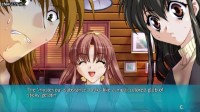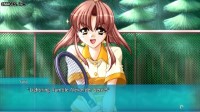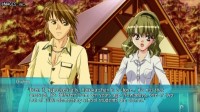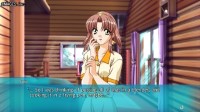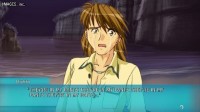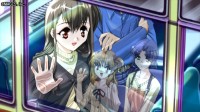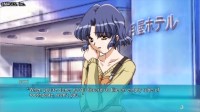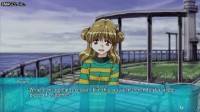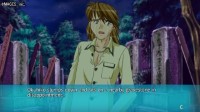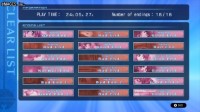Never7
Playtime: 24.1 Hours
Finished 11 May 2025.I played the remastered (and potentially retranslated?) version of this game on the Switch, even with all its flaws, since it was part of a physical double pack release of Never7 & Ever17. My playtime includes achieving all 18 (!) of the endings, played in the recommended order as seen in this guide, starting with Yuka and ending with Izumi.
To be honest, I didn't initially have any interest in playing this, since it's regarded as the weakest game in the Infinity series, bound by the limitations of the VN market at the time it was released. Similarly to games like Utawarerumono, the emphasis on dating sims and different character routes or events dictated the overall tone of Never7, turning what could have been a more focused, succinct experience into one that drags on a decent bit. While I understand that these weren't part of the initial vision, it still doesn't change my opinions on the game, which are very mixed -- not altogether bad, but definitely not up to par with his later works. I haven't played any of the other Infinity games (including Ever17), but I've played the Zero Escape & AI games and really enjoyed those.
The first half of each route is more or less the same with minor differences in the events you see depending on which heroine you go for (of which there are 5: Yuka, Haruka, Saki, Kurumi, Izumi). The common route is basically all slice-of-life, and doesn't really distinguish itself from any other dating sim or romcom VN that I've played; characters are pretty fun and varied, but not hugely memorable in and of themselves. The general premise is that you get a premonition at the beginning of the game that one of the characters will die - who of course is the heroine whose route you decide to choose. Thus, the "second loop" of each route is all about trying to change history to prevent the death from happening, as you somehow find yourself traveling back through time after the heroine dies on the 6th the first time around.
Unfortunately, when combining the multiple time loops per route with the fact that there are 5 main characters with different routes, this game actually ends up repeating lots of the same slice-of-life events over and over again with very minor differences - mostly focusing on how Makoto tries to alter events but without any actual effect on the outcome. This leads to hours and hours of boring do-overs while still needing to pay attention for the occasional dialogue difference here and there. To worsen the deal even further, there are actually 7 distinct routes, as Izumi has two, and Yuka has a secondary route from her own perspective. Even if the fundamental mechanics of this world and the mystery of time travel were well implemented, this game kind of forced itself into a corner simply with the number of times you have to the same things over again.
Even beyond this very basic issue plaguing the game experience, lots of the mechanics of the world itself are not handled well in the writing. This game introduces a bunch of weird and random red herrings or irrelevant information that is generally left unexplained and unexplored. Why is Kurumi actually 3 years younger than Haruka, and what is the nature of her time travel - given that she was still 3 years younger in the "real world"? What's going on with these "perfect clones", and why was it necessary to the plot to begin with, given that it is completely irrelevant outside of establishing an arbitrary familial connection? What's the point of the shrine in the story, if it only comes up in 2 of the endings? The writing is all over the place; tons of events & details exist only for the purpose of adding unnecessary twists or complexity to the plot. It's hard to really care about characters that feel utilitarian in nature; oftentimes the characters don't really feel like they have any consistent personalities at all, but rather exist solely to drive specific events for the plot.
The above also technically applies to the big "twist" of the game; Makoto is afflicted with CURE Syndrome and can somehow determine this delusional reality based on his desire, leading to some of his premonitions and other unworldly powers. It's honestly explained very poorly, as it's implied that the entire reality is a delusion generated in the mind of Makoto in real life after the death of his love interest (in the case of the Izumi Cure route where this is explained, it's Izumi's death). Yet it never really explains if the world of the game is only an illusion or if his dreams affected the real world retroactively somehow. Excepting the very plausible possibility that the confusion comes from a poor or inaccurate translation, I feel like the poor attempt at introducing this mechanic actually ends up making the Izumi routes much worse than the others.
I really enjoyed the first route (Yuka's), since I felt like it had lots of promise for further explorations and explanations of the world. But as I played through the other routes, I noticed that the game didn't really have a central theme or concept it was really driving towards. The premonitions and repetition in Yuka's route gave it a fairly strong theme of pushing against fate, no matter how impossible it seems. Other routes are much more cavalier with the concept, and the Izumi routes abandon it altogether for their loss, as they are the most incomprehensible of the bunch. Ultimately, I feel like this story would need to be completely retooled and rebuilt to fix the numerous issues that I have with it. Less routes with more meaningful implications, and a clearer, more consistent use of CURE Syndrome. As it is, I felt that Never7 fell quite short of its initial promises.

